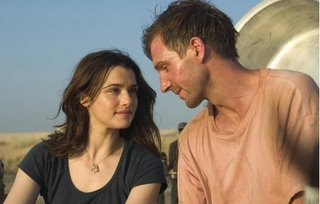
Really good films stay with you long after the theatre. Their images haunt you for days, intruding on your routine and even upsetting you all over again, making you wonder if you should something different in you life. The Constant Gardener is one of those films.
The film has an excellent script based on a famous novel of John Le Carré. As a result all the characters are very well thought and described. The spectator can really understand where they are coming from. Also the theme of the movie is really catching. Murder, scandal and revelations about the way the British government and big pharmaceutical companies work. The humanitarian values are emphasized and the poor-living conditions in Africa are demonstrated. All the details of the narrative really sustain and emphasize the coherence of the film’s story. Moreover Ralph Feinnes seems to be the perfect choice for the main part. His silent looks express perfectly the attitude of quite person that is suffering inside.
Besides the superb story line and the good acting what makes the Constant Gardener a unique film is the combination of the above advantages with a beauty of images and a sophisticated editing. The director has managed to create beautiful images out of the poverty and misery of the African people. The site where Tessa is murdered, for example, has colors so intense and a landscape so beyond natural that manages in spite of its beauty to become a place sinister, a place of death and decay. The editing, on the other hand, with its flash-backs on the relationship of the couple reveals a second parallel story line which is the love story of the film. As Justin (Ralph Feinnes) manages to uncover the scandal of the pharmaceutical company he also reveals the mystery of his dead wife's character and attitude simultaneously restoring his faith and love for her. In this way the film besides being a thriller is a romance about a love that is more true than many Hollywood love stories and has its own unique balance. For Justine Tessa is his consciousness, relentless, just, and completely altruistic. For Tessa Justine is her refuge, an honorable maybe a little bit naïve man who lives outside time and space. In their own way they both protect each other allowing them to be the best of what they are. They complete each other to such extend that one can not exist without the other. When Tessa is murdered Justine is forced to understand his wife to attain her believes and defend her moral position. In this way he becomes one with her and by dying he finally joins her.
4 comments:
Well, last night I saw the second essay of Fernando Meirelles. I admit that your approach to the film satisfies me 95%. Especially, your pointing out of the two parallel stories. For the rest 5% I have an objection. I didn't like that he chose photos by a touristic and stereotyped view. That you call beautiful images. I think this kind of beautification of Kenya was unnecessary. Moreover, his story about the exploitation of the Thrid World was touching the limit of homily, but finally was given away by the strong editing and the characters.
Exactly there is a beautification of Kenya through these images. Still these beautifull country and nature can not feed its people. In this way beuty becomes sinister. take for example the presentation of the lake. It is a beautiful place but did you notice that in the film it is said tha the its water i salty and therefor useless for its people. In this place where life can not grow both heroes die.
really beautiful and well done site!!
Thanks for your praise. It gives me strength yo carry on
Post a Comment